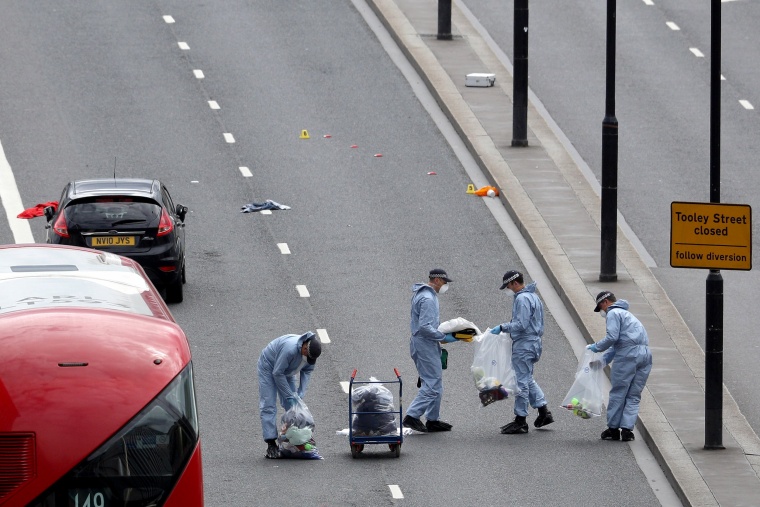LONDON — The violence at London Bridge has once again exhibited the model of a scary new type of terrorist threat: low-budget weapons aimed at "soft targets" in shocking, high-impact attacks.
The viciousness on the bridge and in nearby Borough Market, which killed seven people and injured dozens more, is reminiscent of recent attacks in Europe. They all have brought about tragedy with unconventional, but readily accessible objects, such as vehicles and knives.
"The grotesque violence used in this attack is sadly consistent with the current U.K. threat picture," Brian Dillon, the former head of the London Metropolitan Police's Armed Response Unit, told NBC News on Sunday. "Terrorists have deliberately encouraged the use of easily accessible items such as vehicles and knives. They know they can cause appalling violence and global publicity using a relatively low degree of sophistication."
Similar incidents have occurred in the past year in Nice, Berlin, Stockholm and on London's Westminster Bridge, killing and injuring numerous people. And the London Bridge attack only comes two weeks after the bombing in Manchester outside an Ariana Grande concert.
It is a difficult challenge for law enforcement, as they attempt to stop these attacks before they occur.
Related: London Bridge Attack: Neighbors Describe Police Raids Amid Arrests
"Renting a simple van and getting a few of your like-minded friends to commit this kind of attack is essentially impossible to stop," said Shiraz Maher, a senior research fellow at the International Center for the Study of Radicalization at Kings College.
Attacks such as these often occur in a cluster, according to NBC News Security Analyst Duncan Gardham. They may not be linked, but they are generally ISIS or al Qaeda inspired. ISIS in particular has put a strong focus on reaching out to would-be jihadists to use the tools or weapons immediately accessible to them.
"One terrorist attack does often breed another in a bit of a way like you see clusters of suicides," he said. "One attack bolsters other individuals to follow in the same trajectory."
Nick Heras, the Bacevich Fellow at the Center for a New American Security's Middle East Security Program said that these types of attacks are meant to create a sense of siege in western societies.
"It's a test of their message," Heras explained. "If ISIS' message is powerful and they call would-be jihadist to just do jihad and they do these attacks once or twice a month, it indicates conditions of change in the sense that the message is getting through and conditions of western society have reached a point where it's not possible to stop them."
Heras described it as "Just-Do-It Jihadism," which doesn't cost terrorist groups much in well-trained personnel or the cost of weaponry. They just need to pass along their pitch to second- or third-generation immigrants who understand the political and social dynamics of the countries they live in and warp their sense of belonging.
Related: London Bridge Attack: Brits Refuse to Be Intimidated by Violence
Heras warned that these attacks are aimed to create an existential threat — and a reaction from authorities that will undermine community relationships.
"They don't threaten to collapse the entire society of the country they attack, but they do threaten to erode the spirit of cooperation, multiculturalism and sense of civic peace," he said.
British Prime Minister Theresa May has already promised changes to UK domestic policy in response to the attacks. She said that they need to defeat "Islamist ideology" and to better regulate potential jihadists communications on the internet.
"We cannot and must not pretend that things can continue as they are," she said in a statement to reporters after chairing an emergency meeting with her Cabinet in London on Sunday. "There is — to be frank — far too much tolerance of extremism in our country."
F. Brinley Bruton reported from London and Phil McCausland reported from New York


